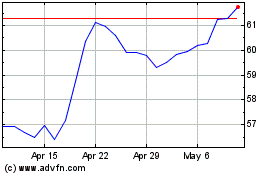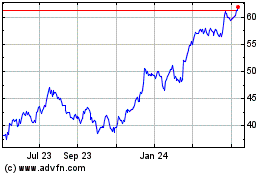Eastdil CEO hopes more nimble firm can better challenge tech and
startup rivals
By Konrad Putzier and Craig Karmin
This article is being republished as part of our daily
reproduction of WSJ.com articles that also appeared in the U.S.
print edition of The Wall Street Journal (June 12, 2019).
Real-estate firm Eastdil Secured LLC is buying back control of
the company from Wells Fargo & Co., betting it can prosper as
an independent boutique operation even as its competitors are
growing bigger and going public.
Led by Chief Executive Roy March, Eastdil struck a deal for a
management buyout, the firm said. Guggenheim Investments' clients
and the Singapore investment company Temasek Holdings Pte. Ltd. are
also taking ownership stakes in the firm. Wells Fargo, which has
owned Eastdil for 20 years, will retain a minority position.
The deal values the firm at more than $400 million, and over
time Eastdil employees will be able to own more than 40% of the
equity, according to people familiar with the transaction.
Mr. March said as a wholly-owned subsidiary of Wells Fargo,
Eastdil felt hamstrung by banking regulations. Now, he is looking
to expand at home and abroad and develop more technology.
The deal, which is expected to close by the fourth quarter,
comes during a period of upheaval in the commercial real-estate
industry.
Co-working upstarts like WeWork Cos. are changing the way
companies rent office space by acting as middlemen between
landlords and tenants. Big property firms like CBRE Group, JLL,
Cushman & Wakefield and Newmark Group Inc. have been getting
bigger, acquiring competitors, adding new business lines or
launching public share offerings.
Mr. March believes that smaller, more nimble firms that focus on
big-ticket sales are better positioned to weather the new
challenges from tech firms and startups.
Co-working firms are increasingly offering leasing, property
management and other corporate services and are aiming to compete
with the big brokerage firms. Big tech companies like Alphabet
Inc.'s Google and Microsoft Corp. may be moving into these
businesses in the future, Mr. March suggested.
"We think that's going to disrupt the entire corporate-services
world," Mr. March said. Because Eastdil focuses instead on sales
and real-estate banking services, he says it is less vulnerable to
the new competition.
His bigger rivals say sovereign-wealth funds, family offices and
other big property investors want one firm to handle all related
business. But some investors warn against underestimating the
Eastdil chief.
"Betting against Eastdil or against Roy March is not a great
idea," said Jonathan Gray, president and chief operating officer of
Blackstone Group LP. "It's a very successful firm that is quite
effective at what it does."
What Eastdil does is large, complex deals. Mr. Gray ticked off a
list of some of Blackstone's biggest over the past dozen years:
acquiring G.E. Capital Real Estate assets with Wells Fargo for $23
billion, the buyout of Sam Zell's Equity Office Properties for $39
billion in debt and equity, and last week Blackstone's $18.7
billion deal for U.S. industrial warehouses held by Singapore's
GLP.
"He's been in the middle of every major real-estate deal in the
world," Mr. Gray said. "The model of being lean and nimble and
below the radar screen has worked for" Eastdil.
Daniel Fournier, CEO of real-estate investment company Ivanhoé
Cambridge, said Eastdil's approach to clients is "extremely
personalized" and that Mr. March is deeply involved. "There will
always be room for that kind of service," he said.
Eastdil says it will remain a specialized real-estate banking
and brokerage firm. It has about 335 real-estate professionals. JLL
and CBRE each have about 90,000 employees.
Mr. March, who is 62 years old, joined Eastdil in 1978 and
became president in 1994. In 1999, Wells Fargo bought the firm for
about $150 million, according to people familiar with the matter.
After Eastdil merged with Secured Capital, Mr. March became
CEO.
Eastdil's business soared as the real-estate market recovered
from the global financial crisis. But stricter regulatory oversight
of big banks curtailed the firm's overseas expansion at a time when
real-estate investors increasingly operate around the globe and
expect their brokers and advisers to do the same.
By 2017, Mr. March concluded the firm needed an ownership
change. "We approached Wells Fargo and said 'it's time to reassess
the relationship, '" he said.
Mr. March hopes the sale will allow Eastdil to develop its own
technology. The regulatory environment around a bank can inhibit
the development of new technology at a subsidiary. He also hopes
Temasek's backing will enable the company to do more business in
Asia, where the fund has deep connections.
In the U.S., Eastdil held the top market share for 2018 and
year-to-date through May in 2019 for real-estate deals greater than
$100 million across all property types in the U.S., according to
Real Capital Analytics.
But its dominance in New York City sales has declined in recent
years, and Eastdil fell to third place in 2017 and to second place
in 2018 for these large transactions, Real Capital said. Some
attribute that fall to a pair of high-profile office brokers moving
to a rival firm in 2016.
"It hurt," said Mike Kirby, co-founder and chairman of research
firm Green Street Advisors. "They really were dominant in their
market share in Manhattan."
Eastdil says its sales business globally has remained
consistent. The firm has also hired some prominent industry figures
recently. That includes broker Will Silverman from Hodges Ward
Elliott, who starts later this month, people familiar with the
matter said.
Eastdil President D. Michael Van Konynenburg said the buyout
enables top employees to acquire a stake in the company and will
keep them on board.
"In our business, a lot of people take checks to go," he said.
"They don't usually write checks."
Write to Konrad Putzier at Konrad.Putzier@wsj.com and Craig
Karmin at craig.karmin@wsj.com
(END) Dow Jones Newswires
June 12, 2019 02:47 ET (06:47 GMT)
Copyright (c) 2019 Dow Jones & Company, Inc.
Wells Fargo (NYSE:WFC)
Historical Stock Chart
From Mar 2024 to Apr 2024

Wells Fargo (NYSE:WFC)
Historical Stock Chart
From Apr 2023 to Apr 2024
